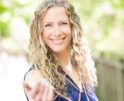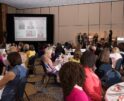
Cokie Roberts – Award-Winning Journalist and Author

Lift Every Voice
By Caroline Cox
Cokie Roberts, 68, is a true champion for women. The three-time Emmy award-winning journalist and bestselling author began her auspicious career when, as she explains, workplace discrimination was accepted – and legal. She learned that, for women to succeed, they’d have to fight to be heard. She’s been speaking out ever since.
Mary Martha Corinne Morrison Claiborne Boggs (nicknamed “Cokie” by her brother) was born the daughter of two Democratic members of Congress. She’s a “founding mother” of NPR and currently works as their senior news analyst, a political commentator for ABC News and a newspaper columnist.
Past gigs include co-anchoring the Sunday morning broadcast This Week with Sam Donaldson & Cokie Robertson ABC, PBS news contributor and CBS News reporter. The former president of the Radio and Television Correspondents’ Association has also won numerous awards – including the Edward Weintal Prize for Diplomatic Reporting. American Women in Radio and Television named her as one of the 50 greatest women in the history of broadcasting. And she’s a breast cancer survivor to boot.
Here, she talks to Little PINK Book about her legendary career, having her credibility questioned and the legacy she hopes to leave.
Little PINK Book: What’s the biggest issue for working women today?
Cokie Roberts: The biggest problem in the workplace is balance. The majority of people coming out of college and graduate school are female. If women find a hostile work environment where they can’t do the things they need to do to take care of their families, we lose the best and the brightest, [jeopardizing] our competitiveness as a country. Many are also caring for siblings, elderly parents, spouses or friends in need. There are lots of times when caretaking needs to happen. The workplace has to be far more flexible and accommodating. Otherwise we’re going to lose our best people.
LPB: Do you think companies should be more accommodating?
CR: Yes. The companies that have made it possible for people to do the things they need to do in their personal lives will find [it benefits] their bottom line. But it’s hard to change. The mud is a happy place to get stuck.
LPB: What’s your success secret?
CR: Working very hard. Women my age, we came into the workforce when it was legal to say, “We don’t hire women to do that.” We had to work harder than the guys and be smarter, but that wasn’t hard. [Laughs]
LPB: How do you balance Life/Work?
CR: The main thing to keep in mind is what works for you doesn’t necessarily work for somebody else. You have to keep recalibrating. What works one year doesn’t always work the next. It’s about constantly trying to refigure it out, as painful as that is. It’s not just taking care of individuals, but being part of our communities and institutions as well.
LPB: What’s the best business advice you’ve ever received?
CR: It was from my mother, who was a very successful professional. [She served as a former ambassador and Democratic Congresswoman]. Essentially, it was, “Just relax. It’s going to be OK.” If your values are in the right place, it’s going to be okay.
LPB: You’ve had your professional credibility questioned in the past – from standing in front of a green screen pretending to be at the U.S. Capitol Building to openly criticizing Glenn Beck.
CR: In [journalism], credibility is everything. If something comes up to challenge you [in your field], you have to answer it. With any luck, you can get your organization behind you. I’ve found female friends and colleagues will gather around and stand behind you if you’re challenged.
LPB: What’s the biggest career risk you’ve taken?
CR: Anytime I take on something new, it’s a risk. Whether that’s moving from reporting to anchoring, or from broadcasting and reporting to writing books – that was a big risk. I was scared to death that people would think I didn’t know what I was talking about. “Who is she to do that?” Fortunately the books did very well. They spoke for themselves.
LPB: How do you relax and unwind?
CR: My family and I have a beach house in South Carolina that I love to go to. My time when I’m not working is almost entirely spent with my family. [She and her husband, fellow journalist Steven V. Roberts, have two children.] I have a 96-year-old mother and six grandchildren ranging in age from 6 to 11. Occasionally, we take a nice trip some place. In terms of getting perspective, I also do a good deal of work with Save the Children. I travel to programs around the world. I take one big trip a year, then do a lot of short [trips].
LPB: How did you deal with discrimination early in your career?
CR: It helped when the law changed. That was huge. It’s very important for young women to understand that. Having the law on your side makes a tremendous difference. At that time, there was a group of us who came out of college better educated than women before us at the same time as the Civil Rights movement. There was a kind of “power to the people” thing going on. We supported each other and held people’s feet to the fire when they did discriminate. Sometimes it worked and sometimes it didn’t. The main way you succeeded was to have your work speak for itself.
LPB: What’s one thing most people don’t know about you?
CR: I do very nice needlework. [Laughs]
LPB: How do you define personal and professional success?
CR: There are probably two different definitions, because I care much more about personal success. Personal success is children who are wonderful people married to wonderful people who have great little people. There’s nothing even close to being that important or rewarding. Professionally, by any metric you’d have to say that I’ve succeeded. The work I’ve done, the books I’ve written and the success they’ve had. My success is measured by people who watch and read. It’s kind of out there for everybody to see.
LPB: What legacy do you want to leave?
CR: I would like to leave a legacy where people know more about women in our history, their contributions to our country and the workings of our current government than they would have known had I not been here.
Recommended
-
Do You Have The Imposter Syndr...June 18th, 2022
-
1 Key Email Marketing Tips For...January 6th, 2022
-
Six Tips For Choosing A PEO Se...September 20th, 2021
-
Top Women Profiles, PINK Lists...July 20th, 2021
-
Black Lives Matter. PINK Stand...June 15th, 2020
















